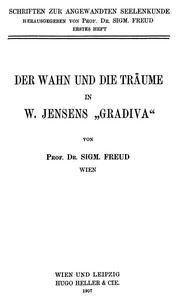Der Wahn und die Träume in W. Jensens »Gradiva« by Sigmund Freud
"Der Wahn und die Träume in W. Jensens »Gradiva«" by Sigmund Freud is a scientific publication written in the early 20th century. The book examines the psychological themes present in the novella "Gradiva" by Wilhelm Jensen, particularly focusing on the character Norbert Hanold and his interactions with the dreamlike figure of Gradiva, exploring the relationship between dreams, desires, and the nature of reality. Freud's analysis intertwines elements of psychoanalysis and literature, providing
insights into human psychology and the workings of the mind. The opening of the work introduces the main premise: Freud's intention to explore dreams not just as simple occurrences but as complex narratives constructed by poets and authors, reflecting deeper emotional and psychological truths. The text details Hanold's obsession with an ancient relief depicting Gradiva, illustrating his growing detachment from reality and his romantic fantasies about her. Through a mix of dreams and conscious desires, the narrative sets the stage for the examination of how these elements manifest in Hanold's psyche, exploring the possibility that his dreams about Gradiva are symbolic representations of his repressed memories and feelings stemming from a childhood connection to a girl named Zoë, ultimately leading into a deeper analysis of love, desire, and the impact of the past on the present. (This is an automatically generated summary.)
Read or download for free
| How to read | Url | Size | |||
|---|---|---|---|---|---|
| Read now! | https://www.gutenberg.org/ebooks/35549.html.images | 218 kB | |||
| EPUB3 (E-readers incl. Send-to-Kindle) | https://www.gutenberg.org/ebooks/35549.epub3.images | 119 kB | |||
| EPUB (older E-readers) | https://www.gutenberg.org/ebooks/35549.epub.images | 120 kB | |||
| Kindle | https://www.gutenberg.org/ebooks/35549.kf8.images | 186 kB | |||
| older Kindles | https://www.gutenberg.org/ebooks/35549.kindle.images | 168 kB | |||
| Plain Text UTF-8 | https://www.gutenberg.org/ebooks/35549.txt.utf-8 | 201 kB | |||
| Download HTML (zip) | https://www.gutenberg.org/cache/epub/35549/pg35549-h.zip | 109 kB | |||
| There may be more files related to this item. | |||||
Similar Books
About this eBook
| Author | Freud, Sigmund, 1856-1939 |
|---|---|
| Title | Der Wahn und die Träume in W. Jensens »Gradiva« |
| Note | Reading ease score: 60.1 (8th & 9th grade). Neither easy nor difficult to read. |
| Note | Wikipedia page about this book: https://en.wikipedia.org/wiki/Delusion_and_Dream_in_Jensen%27s_Gradiva |
| Credits |
Produced by Jana Srna and the Online Distributed Proofreading Team at http://www.pgdp.net |
| Language | German |
| LoC Class | PT: Language and Literatures: Germanic, Scandinavian, and Icelandic literatures |
| Subject | Psychoanalysis |
| Subject | Jensen, Wilhelm, 1837-1911. Gradiva |
| Category | Text |
| EBook-No. | 35549 |
| Release Date | Mar 11, 2011 |
| Most Recently Updated | Mar 9, 2012 |
| Copyright Status | Public domain in the USA. |
| Downloads | 193 downloads in the last 30 days. |
| Project Gutenberg eBooks are always free! | |


